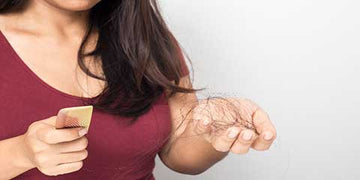by Anthony Benjamin on Oct 12, 2022

Tips to Prevent Hair Loss After Bariatric Surgery
After Bariatric Surgery most patients will experience some level of hair loss. This is not permanent and usually occurs three to five months after your operation. The loss occurs due to the physiological stress of surgery, hormonal changes, and the rapid weight loss. As a defense mechanism your body can ‘turn off’ non-essential (cosmetic) functions, like hair growth, and will focus nutrients towards your vital organs, such as the heart and brain. This dormant state is when hair loss occurs. As your body recovers from the initial shock of the surgery and rapid weight loss, functions will even out again and, provided there is adequate protein and no nutrient deficiencies, your hair should grow back.
Hair loss chances vary depending on weight loss surgery type. An adjustable band (lap-band) patient has more gradual weight loss and does not have as high a risk of nutritional deficiencies, therefore they have a lower tendency to experience hair loss. Gastric Sleeve and Gastric Bypass procedures require higher vitamin regimes due to the nature of the procedures and the weight loss is more rapid causing a larger disruption to your body. (read as higher likely hood of dormant period and period of nutritional deficiencies)
Here are some easy hair loss tips to help prevent & recover from hair loss before and after surgery.
Protein is king!
Protein is the building block of all cells, including the cells that make up your hair. You will be given a protein goal to meet daily after your surgery, this is the best way to keep your body from feeling deprived of nutrients and keep it feeling there is adequate protein to continue non-essential functions like hair growth. Make sure you consume lean protein foods with your meals. (We actually recommend eating the protein first to make sure you don’t feel full before consuming it) Lean meats include: chicken without the skin, lean red meat, grilled/baked fish, Greek yogurt, low-fat string cheese, cottage cheese, beans, and protein bars (watch the carbs & sugars). Vegetarians need to pair different protein options at each meal to ensure you are consuming all the necessary amino acids your body requires. Vegetarian examples include beans, peas, quinoa, chia seeds, flax and soy. Protein shakes are quick and easy but should NOT be your only form of protein

Think of your Vitamins as Medications.
Aside from preventing nutrient deficiencies your multivitamin and mineral requirements serve a very important purpose in your body and how it functions overall. Take your bariatric multivitamin consistently and remember to space out your calcium in 2-3 doses a day. Follow the plan you are given by your doctor/dietitian as they know your body and what it best needs to recover quickly and be healthy! Many programs will have you starting your vitamin two weeks or more before surgery to help prevent hair loss and fatigue associated with low nutrient status. Nutrient deficiencies can show up quickly or by surprise a year post op, some are easy to correct, and some have lasting effects and detriments to your health. Remember: taking the appropriate vitamin and mineral supplements is an investment in your health and will pay dividends to you in the years ahead.
Be Iron Man or Woman! 
Iron is the micronutrient most commonly related to hair loss, and iron deficiency is a shockingly common condition in the United States, even more so among bariatric patients! Early signs of an iron deficiency present as dizziness, fatigue, or light-headedness, a fast heart rate or heart palpitations, or brittle nails. Ferritin levels are indicative of iron storage in the body and low ferritin levels are associated with hair loss. Have your iron levels checked if you are still losing hair seven months post-surgery. Make sure you are getting iron in your multivitamin and also in your food. Red meat, egg yolks, dark leafy greens, beans/peas/legumes and iron-enriched cereals are great ways to supplement your iron.
Add Zinc. 
Zinc plays an important role in hair growth and repair. Your multivitamin will contain some level of zinc but if you continue to experience hair loss you may want to supplement additional zinc. Be sure to speak with your dietitian or doctor before starting a zinc supplement as excessive amounts of zinc can have side effects. Foods high in zinc include oysters, beef, spinach, wheat germ, pumpkin seeds and lentils.
There is no definitive answer for avoiding hair loss, but adequate protein, vitamins, and minerals are critical to your body’s ability to grow hair and recover after surgery. Your body will need time to balance out internally and then begin its regrowth of the hair.

Thyroid Health: Obesity & Bariatric Surgery

Why Does Weight Loss Surgery Work?

Find Your Support Systems

